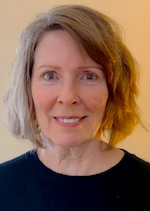
We’re excited to welcome Mary McEathron, PhD, as research associate and lead evaluator of the Trainer and RBPD Specialist Support (TARSS) program. McEathron received her doctorate in evaluation studies at the University of Minnesota and has more than 20 years of experience conducting evaluations and research projects. Before joining CEED, her experience included leading Rainbow Research, a nonprofit community-based research and evaluation organization, as executive director; she was also director of the Evaluation Group at the Institute on Community Integration.
What was the educational or career path that led you to focus on evaluation?
MM: My path to evaluation was very indirect, which is something that I’ve heard from a lot of people in this field. In my case, I studied biology and creative writing for my undergraduate and master’s degrees, after which I worked in nonprofits and program management locally and internationally for a number of years. During that time, program evaluation started to become a more common practice, so I had some familiarity with the basics.
The real pivot point in my career, though, came when my husband and I moved back to the Twin Cities in 2001. When we first arrived here, I worked in a temp job at the University of Minnesota. The unit I was working for needed to do focus groups. I happened to see a flyer for a 3-day workshop offered by the Minnesota Evaluation Studies Institute (MESI) that included a course on focus groups. I said to my manager, “How about I go to this workshop and learn about focus groups?” I got the go-ahead, and at the workshop I met a lot of local leaders in the field and learned that UMN had a degree program in evaluation studies. At the end of the first day of the workshop, my husband asked me, “How did it go?” I told him it looked like I would be going back to grad school!
How would you define evaluation for a layperson?
That’s a great question. When I tell people that I’m an evaluator, they sometimes ask, “What do you evaluate?” When I say I evaluate programs, many people ask, “Why?” People who have worked in grant-funded programs tend to know about evaluation simply because they are required to do it, but unless you have that experience, it may not be at all clear what it means or why it’s important.
What I usually say to people who aren’t familiar with this type of work is that evaluation is applied social science research. An evaluator works with a client or project staff and figures out how to answer questions about their program or project. These can be questions like, “What is working? What is not working? How do we know?” Evaluation pulls from the same set of quantitative and qualitative tools as research. It’s a little hard to generalize about the specific activities involved in evaluation, because there are literally hundreds of approaches.
The bottom line is that programs and organizations want to learn about what they are doing. They want to know what is working and what is not working and why. Sometimes, because evaluation is required by funders, the focus is on accountability. Accountability is important, but my favorite thing is to work with people who are curious. They want to make discoveries about their programs using evaluation tools. I love to help people get in touch with that curiosity—even when they start out thinking that evaluation just means checking a required box on a grant report.
Talk about your role at CEED.
The major focus of my role is evaluating the TARSS program. I’ll also help with other evaluation projects at CEED and provide technical assistance to the whole team for their qualitative research and evaluation programs. Part of why it’s so wonderful to join CEED is that curiosity piece that I mentioned earlier. This team has a great feel for the best uses of evaluation. They approach their work with a desire for knowledge and understanding. So I’m thrilled to join forces with my colleagues and add even more momentum to their work.
What will evaluating the TARSS program look like?
Right now, we are reviewing and implementing our evaluation process. What I can say at this point is that the work of TARSS is to support the full community of early childhood trainers and coaches in Minnesota. That means making sure that the feedback loop through which we gain knowledge about the program is working. What I mean by that is we need to create a cycle of knowledge sharing that includes all our stakeholders: TARSS staff, DHS staff, the practitioners in the field, and the educators whom they serve. We obtain data using different methods—focus groups, one-on-one interviews, surveys, training evaluations, etc.—and then we analyze that data and share it with the early childhood professional development field to help create change and improve programs.
Whatever data-gathering methods we use, it’s important to honor the time and effort it takes for stakeholders to provide us with feedback. We’ll ask people in the field what they need with an emphasis on inclusion so that all voices have the opportunity to be heard. The best decisions are made through that cycle of knowledge sharing.
What are some of your interests outside of work?
I love long walks and hikes in the woods, writing, and cooking dinner with my husband. I’m also really looking forward to farmers markets opening up soon.

